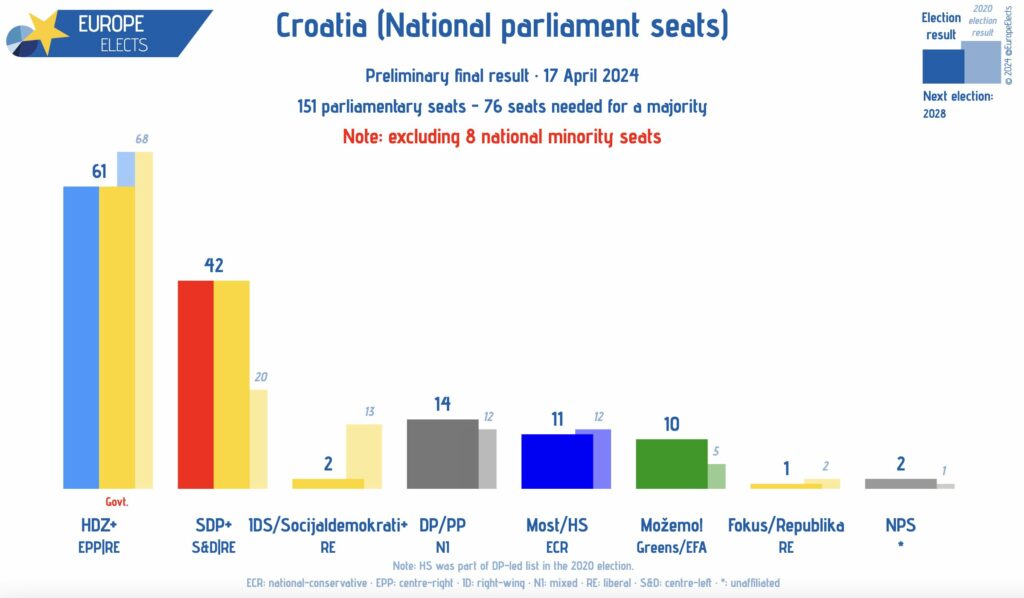Ruling HDZ wins, but fails to secure majority, in Croatian election
Reading Time: 3 minutesThe ruling conservative Croatian Democratic Union (HDZ) won the most seats but failed to secure a simple majority in the snap parliamentary election held on Wednesday, 17 April.
The HDZ won 61 seats (down 7) in the 151-member assembly, to 42 (up 22) for the Social Democratic Party-led (SPD) centre-left coalition.
The national-conservative Homeland Movement party, which came 3rd with 14 seats, is more closely ideologically aligned to the HDZ and may now play kingmaker, although the SDP is also trying to assemble a majority in the EU member state of 3.8mn people. SDP leader, Peda Grbin said, “Its not over… days, weeks and perhaps months of talks are ahead of us”.
Of the other parties, national-conservative Most/HS-ECR gained 11 seats and green left-wing Mozemo! doubled its number of mandates to 10. Seats for the centrist/centre-left alliance IDS/Social Democratic Party will fall from 13 to 2 in the next parliament. Centrist NPS and liberal Fokus/Reformists secured 2 and 1 mandates respectively. Irregularities were recorded at two polling stations, delaying the final election results until next week.

Bitter campaign between two old political foes
Croatian Prime Minister Andrej Plenkovic wrote on Facebook the following day: “The HDZ has won the parliamentary elections for the third time in a row. Taking care of the interests of the Croatian state, our priority is to form a stable and strong government as soon as possible,” Plenkovic added.
Plenkovic and the HDZ, Croatia’s dominant political force since it gained independence in 1991, had been clear favourites to secure a third term for him as premier. That was until Milanovic declared that he would stand as the SPD candidate, then resign as head of state after securing victory. As the country’s most popular politician, Milanovic helped SDP more than double its number of MPs in the election. However he fatally ignored advice from the Constitutional Court that he should step down as president before participating in the campaign.
As head of state, Milanovic dissolved Parliament on March 18, triggering the snap election. What followed in the ensuing month was a bitter campaign between conservative Plenkovic and the centre-left Milanovic, who accused his opponent of leading the “most corrupt government in Croatia’s history”.
However a twist in the tale came just two days after the election, on Friday, 19 April, when the country’s top court ruled that as head of state, Croatian President Zoran Milanovic had been ineligible to stand as a prime ministerial candidate.
With the vast majority of votes counted, Croatia’s top court barred the victorious Milanovic from heading up the new government, on Friday, 19 April. Croatian Constitutional Court President Miroslav Separovic recalled that “the president was warned that he should resign and could not participate in the campaign as head of state”, adding that “all are obliged to adhere to the constitution and the law”, underlining that Milanovic “cannot be prime minister-designate”.
Court rules Milanovic was ineligible candidate
Milanovic accused Plenkovic and the Court of planning a coup d’etat. He wrote on Facebook on Friday, 19 April, after the Court verdict: “Don’t be afraid! In this view, the Parliament is supreme. This story that the Constitution is above Croatian people can only come from a strange mind if it is a mind at all. Most voters voted for change, this should be respected. Only the parliamentary majority decides who will get the mandate,” Milanovic added.
The president nominates the prime minister based on election results, can dissolve Parliament and heads the armed forces, meaning the holder of the post of Croatian head of state contributes to the country’s foreign policy.

